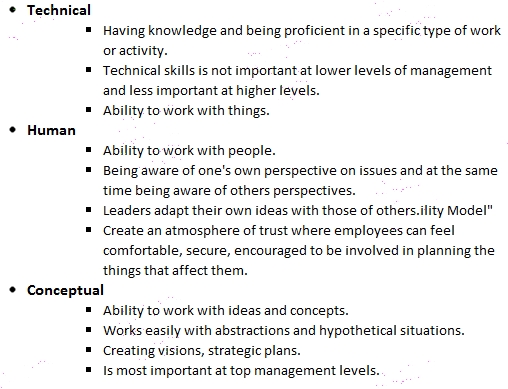One component of this week’s lesson that really resonated with me was the importance that Katz assigned to his three skill types based on a leader’s level of management. Katz’s three-skill model breaks down into the following skill types shown in the graphic below:

(Abolrous, 2012)
In a nutshell, Katz theorized that the further a leader got away from day-to-day and unit or department specific responsibilities and closer to more global operational or organizational level management (e.g. from a supervisor or department manager to a director or officer), the less Technical and more Human and Conceptual skill would be needed (p.44-47, Northouse, 2012).

(Abolrous, 2012)
One thing that I have seen a great deal of in my professional life is a tendency for senior leadership to place individuals in leadership roles based on immediate need or an ascending movement through the leadership hierarchy rather than based on their present skills, abilities and knowledge. What often seems to end up happening here is the company creates a situation where there is a low level supervisor who may have great leadership qualifications in one area or two areas, but not enough in the other/s to effectively manage his or her subordinates or respsibilities. How can a leader assess the performance level of his or her subordinates if he or she does not have extensive knowledge about what constitutes such performance? How could such a leader coach or help to improve the subordinate’s performance? How can a leader gain the respect of the front-line employees if that leader is incapable of performing the work that the employees do to the performance level that the leader demands? In my experience, this is often a losing battle for the leader.
At first glance, the obvious answer seems to be that organizations should simply promote or hire leaders with superior technical skill as opposed to superior human or conceptual skill, but this too is a concern (and something I’ve also seen occur all too often). It’s rather nonsensical to promote your best skilled workers to reward them for that skill and performance and put them into a position where they can no longer use that skill to be a top producer and one that demands Human and Conceptual skills that they may not have. All too often leaders are promoted or placed into roles without definitive leadership training that serves to enhance those skills to competent levels for their place in the management hierarchy –if this is even possible as I’ll discuss below. At times it’s almost as if a leader is hired or promoted thinking that they will be self-sufficient in acquiring these skills on their own or that eventually, they will end up at a level where their deficiency is not necessarily a weakness.
I wonder if this type of thinking and promotion strategy is too dependant on a belief that leadership skills are truly nothing more than a skill rather than a trait or a combination of skills and traits. Is it really feasible that someone with otherwise great Human and Conceptual leadership skills to go from knowing nothing about computers to leading a team of computer programmers, or must one have prior abilities and knowledge (skills) or aptitude and intelligence (traits) in order to be able to improve and function at a high level? Similarly, would someone of a personality type that is not described as a people person be able to alter the fundamental way that he or she naturally interacts with others in order to improve their Human skills? How about someone with low spatial intelligence or a limited ability to think in the abstract? How would such a person manage to draw from or improve their Conceptual skills? Is this a skill or a trait limitation? I think the skills models have a lot of wonderful insights, but I wonder if they assume too much about what components go into proficiency of a skill because it seems to me that there are a number of underlying traits and human behavioral patterns which are not easily alterable (if they can even be altered at all) that contribute to skill-level abilities.
References:
Abolrous, H. (2012). Leadership theories . Retrieved from http://www.abolrous.com/hazem/leadership.htm
Northouse, P. G. (2013). Leadership: Theory and Practice (6th edition). Thousand Oaks, California: Sage Publications.
